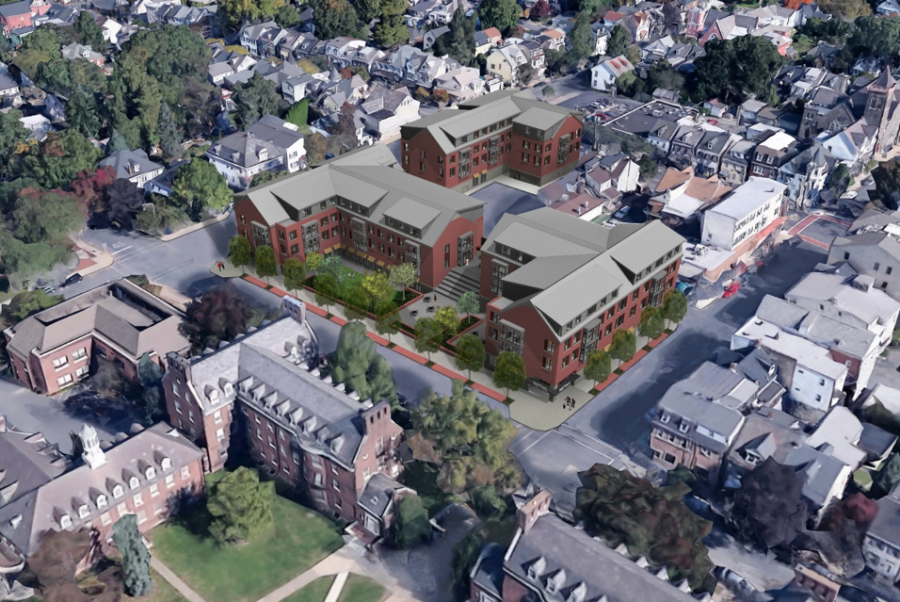The Easton Planning Commission voted 5 to 1 to recommend that Lafayette’s subdivision and land development plan not be approved for their new dormitories on McCartney Street. The Easton Zoning Board receives their recommendation and has final say on approval, but the college can withdraw their plans from consideration by the board.
While the dorms may require 200 or more additional parking spaces, the college’s plan does not provide those on site and instead relegates them to the planned Bushkill lot, which college officials said meets the parking needs. This lot is located 1,500 to 2,000 feet away from the dormitories themselves.
The college sent an email to the campus community on Thursday that although the commission “denied the College’s proposal for a mixed-use student-housing project along McCartney Street,” Lafayette’s plans “have always included multiple sites” as alternative options.
The college has maintained that its parking analysis confirms it will provide enough parking spaces for the facilities it plans to add, but many community members remain unconvinced.
Residential critics of expansion expressed concern that the college could shrink or even shut down in the future, thereby leaving its McCartney and Catell dormitories empty. These could be converted into apartment buildings, but they would have no surrounding parking spots for residents.
College hill residents also said they were worried about the college’s lack of compliance with Americans with Disabilities Act, the expansion plan’s disregard for the Easton Comprehensive Plan and continued dismay over parking.
President Alison Byerly and Vice President of Finance Roger Demareski said that the college has worked with the community since the inception of the plans in order to best accommodate community concerns.
Both Demareski and Byerly added that the concerns come from a vocal but small group of college hill residents. City planner and Lafayette professor Paul Felder, who has been a vocal critic of the college’s expansion, disagrees.
“I think that’s a very antidemocratic view,” he said, because most college hill residents who speak at the public meetings have spoken out against the plans. “To argue that the majority of people are for it is saying that the people we haven’t heard from are on our side.”
A city ordinance from 2003 stated there was parking congestion in the area of the neighborhood near the college. Addressing this problem, the ordinance designates a dozen blocks which Lafayette students can be issued permits to park on.
By Felder’s estimates, those blocks hold about 155 spots. The college currently issues 250 student parking permits for that area, and plans to lower the number to 190. Demareski said in the meeting that the college did not have an estimate for the amount of spots available in that area.
“I think we’d have to do our own analysis of the capacity,” Demareski said. He went on to say that “Felder’s interpretation alone does not mean [there are] violations.”
Felder suggested an alternative plan during his presentation. He said that a compromise between the college and community members could be an underground parking garage beneath the dormitories which would provide the parking spaces required by the zoning on-site, and he also offered a redesign of the dormitories to fit the neighborhood’s historical character.
Byerly said that the college’s plans for the dormitories are generally set and that the college has extensively worked with College Hill residents to plan dormitories that “better fit the character of the neighborhood.”
Planning commission vice chair Robert Sun said he was concerned that the college was not knowledgeable of zoning ordinances surrounding parking before appearing at the meeting. At the end of the meeting, Demareski asked for an adjournment for 30 days so the college could take into account the concerns they heard there. The planning commission did not grant the adjournment.
It was debated at the meeting whether the plan would need to be granted certain zoning variances by the Zoning Board. The variances may be needed the college to bend the city’s zoning laws requiring a certain amount of parking spaces and space for loading berths required by the planned dormitories, but the college said it provides these.
In April, the Easton City Council approved zoning law changes for the college to build the dormitories to a height and impervious coverage greater than the laws originally allowed. The college will continue to undergo approval processes regarding their plans and construction.





















































































































